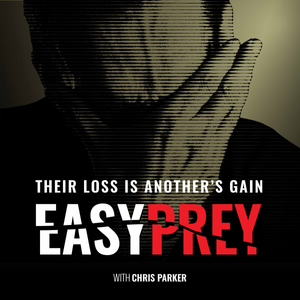
Securing IoT and Cyber Warfare with Mikko Hypponen
08/16/23 • 37 min
Our home IoT devices are constantly being probed for weaknesses so that they can be compromised and used for broader nefarious purposes like cyber warfare. The Ukrainians may be considered some of the best in the world when it comes to defending against cyber warfare because they have been regularly attacked and have been defending their systems for years. Today’s guest is Mikko Hypponen. He has written for The New York Times, Wired, and Scientific American and has lectured at universities like Oxford, Stanford, and Cambridge. Mikko works as the Chief Research Officer for WithSecure and sits on the advisory board of Europol.
Show Notes:- [1:11] - Mikko shares his background as an old-school hacker.
- [2:46] - His mother advised Mikko to pursue this career in the 1980s.
- [5:23] - Smart devices like doorbells and refrigerators are not configured correctly because security makes the device more expensive.
- [7:50] - Mikko discusses regulation in Europe and how, most of the time, regulation fails.
- [9:03] - Many hackable devices wouldn’t be hackable if consumers read the manual.
- [11:13] - Most malware traffic used to be Windows based but is now Linux based.
- [12:26] - Many people don’t think that there’s any data that can be stolen from IoT devices, but they are surprisingly powerful.
- [14:16] - Mikko explains some recent attacks.
- [15:43] - Medical devices are just as vulnerable as any other IoT device.
- [17:41] - What is a honeypot?
- [19:02] - Mikko shares that he has been a victim himself with his credit card number stolen twice.
- [20:14] - Even experts make mistakes.
- [21:26] - If you believe you have been hacked or think you are being scammed, take a step back.
- [23:06] - Mikko describes some of his experience living so near Russia and monitoring cyber warfare.
- [25:07] - Spying and espionage is a big problem in countries bordering Russia.
- [30:06] - With invasions in 2022, Ukraine improved many systems.
- [31:20] - Mikko makes a prediction on what will come next that sounds like Science Fiction, just like cyber war sounded like before.
- [32:18] - What are Mikko’s thoughts on AI?
Thanks for joining us on Easy Prey. Be sure to subscribe to our podcast on iTunes and leave a nice review.
Links and Resources:Our home IoT devices are constantly being probed for weaknesses so that they can be compromised and used for broader nefarious purposes like cyber warfare. The Ukrainians may be considered some of the best in the world when it comes to defending against cyber warfare because they have been regularly attacked and have been defending their systems for years. Today’s guest is Mikko Hypponen. He has written for The New York Times, Wired, and Scientific American and has lectured at universities like Oxford, Stanford, and Cambridge. Mikko works as the Chief Research Officer for WithSecure and sits on the advisory board of Europol.
Show Notes:- [1:11] - Mikko shares his background as an old-school hacker.
- [2:46] - His mother advised Mikko to pursue this career in the 1980s.
- [5:23] - Smart devices like doorbells and refrigerators are not configured correctly because security makes the device more expensive.
- [7:50] - Mikko discusses regulation in Europe and how, most of the time, regulation fails.
- [9:03] - Many hackable devices wouldn’t be hackable if consumers read the manual.
- [11:13] - Most malware traffic used to be Windows based but is now Linux based.
- [12:26] - Many people don’t think that there’s any data that can be stolen from IoT devices, but they are surprisingly powerful.
- [14:16] - Mikko explains some recent attacks.
- [15:43] - Medical devices are just as vulnerable as any other IoT device.
- [17:41] - What is a honeypot?
- [19:02] - Mikko shares that he has been a victim himself with his credit card number stolen twice.
- [20:14] - Even experts make mistakes.
- [21:26] - If you believe you have been hacked or think you are being scammed, take a step back.
- [23:06] - Mikko describes some of his experience living so near Russia and monitoring cyber warfare.
- [25:07] - Spying and espionage is a big problem in countries bordering Russia.
- [30:06] - With invasions in 2022, Ukraine improved many systems.
- [31:20] - Mikko makes a prediction on what will come next that sounds like Science Fiction, just like cyber war sounded like before.
- [32:18] - What are Mikko’s thoughts on AI?
Thanks for joining us on Easy Prey. Be sure to subscribe to our podcast on iTunes and leave a nice review.
Links and Resources:Previous Episode

Behavioral Analysis From an FBI Expert with Robin Dreeke
Our non-verbal communication is as much or more important than what we verbally communicate. We may display mannerisms that our gut instincts pick up as just off, but a trained FBI Behavioral Analysis can pick up on these signs faster than you might expect. Today’s guest is Robin Dreeke. Robin is an accomplished executive coach, bestselling author, and professional speaker with an impressive background. As a Marine Corps officer and retired FBI Special Agent, he served as Chief of the Counterintelligence Behavior Analysis Program where he honed his skills on recruiting spies and behavioral assessment. Robin has translated his expertise into his unique interpersonal communication strategies that focus on recruiting allies in business.
Show Notes:- [1:23] - Robin shares his background and previous roles in the Marine Corps and FBI.
- [2:45] - Robin has not been a victim of a scam, but there have been many attempts and close calls.
- [6:02] - We establish normal patterns of behavior and tempo.
- [7:52] - Be wary of things that deviate from normal patterns of behavior.
- [10:19] - If we’re trying to find something wrong, we miss a lot.
- [14:07] - Robin explains why he looks for openness, honesty, and transparency in a nice even tempo.
- [15:42] - Underneath “why” is the “what” and the “how.”
- [17:30] - Vulnerability is the willingness to show your shame.
- [20:17] - Words are extremely powerful.
- [22:24] - The more time spent with someone, you will be able to learn their natural tempo and behavior patterns.
- [24:34] - The techniques Robin talks about aren’t just applicable to criminal interviews, but even just personal conversations.
- [26:07] - Master manipulators are on a timeline. Usually they’re not patient.
- [28:52] - Sales people can also use these techniques to push the tempo out of your comfort zone.
- [31:31] - Robin only vets people based on in-person interactions now.
- [33:12] - Robin compares reality to shows like Criminal Minds.
- [35:43] - The actions that people will take are predictable.
- [37:52] - Some people have the tendency to find something wrong with everyone and everything.
- [40:08] - Focus on having a great conversation with other people.
Thanks for joining us on Easy Prey. Be sure to subscribe to our podcast on iTunes and leave a nice review.
Links and Resources:Next Episode

Why We Fall for Scams with Chris Chabris and Dan Simons
Scammers, like magicians, use distractions and illusions to keep you from realizing what is really going on. They may choose to have you focus on something that is urgent hoping that you’ll make mistakes that you normally wouldn’t.
Today’s guests are Chris Chabris and Dan Simons. Dr. Chabris is a Cognitive Scientist who has taught at Union College in Harvard University and is a fellow of The Association for Psychological Science. His research focuses on decision-making, attention, intelligence, and behavior genetics. Chris received his PhD in Psychology from Harvard University.
Dr. Daniel Simons is a professor of Psychology at the University of Illinois, where he has the Visual Cognitive Laboratory. Dan received his PhD from Cornell University. His research explores the limits of awareness and memory, the reasons why we often are unaware of those limits, and the implications of such limits on our personal and professional lives.
Show Notes:- [1:18] - Dan and Chris share their background and what their current roles are in their industry.
- [3:27] - Why did Dan and Chris decide to write a book together?
- [6:12] - Stories of victims are engaging and interesting, but these stories don’t focus on why we are fooled.
- [8:53] - Chris and Dan share the story of a time they were almost scammed.
- [13:01] - Fictional stories in movies get some things right about what con artists exploit, but real scenarios are not always so precise.
- [14:52] - We have the ability to focus on a select amount of the information in front of us.
- [16:39] - There are a lot of different techniques that scammers employ to put you under time pressure.
- [19:59] - Confirmation bias is the idea that you try to find evidence of what you believe.
- [21:04] - There are a lot of theories about why we are good at some things and not as good at others.
- [22:15] - It is logical to trust someone you know, but social media has created the opportunity to trust misinformation.
- [24:38] - Commitments are assumptions that we make and hold steadfastly to.
- [26:41] - It is easy to trust someone when you’ve committed to your perception of them.
- [28:33] - Ask yourself if there is anything you believe that could be proven wrong if you were given new information.
- [31:01] - External validation is a great source for seeing things you might have missed.
- [32:48] - There are scams in literally everything, even chess.
- [38:02] - Are scams increasing or is it awareness of scams that is increasing?
- [40:26] - All scams employ the same principles. They are always going to rely on the same tricks and tap into the same fears.
- [42:37] - Dan’s hope is that people will question the information they get and become less accepting.
Thanks for joining us on Easy Prey. Be sure to subscribe to our podcast on iTunes and leave a nice review.
Links and Resources:If you like this episode you’ll love
Episode Comments
Generate a badge
Get a badge for your website that links back to this episode
<a href="https://goodpods.com/podcasts/easy-prey-292903/securing-iot-and-cyber-warfare-with-mikko-hypponen-38325548"> <img src="https://storage.googleapis.com/goodpods-images-bucket/badges/generic-badge-1.svg" alt="listen to securing iot and cyber warfare with mikko hypponen on goodpods" style="width: 225px" /> </a>
Copy




